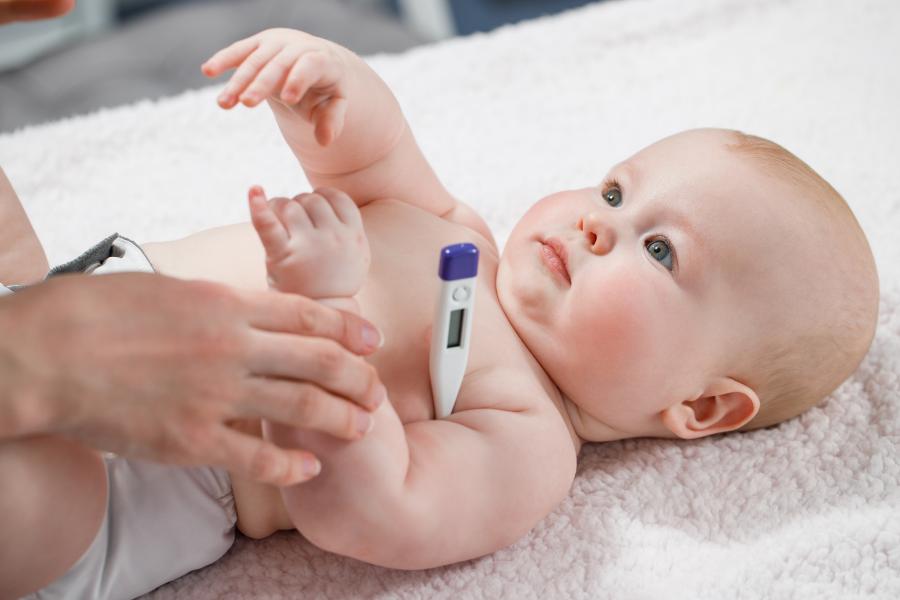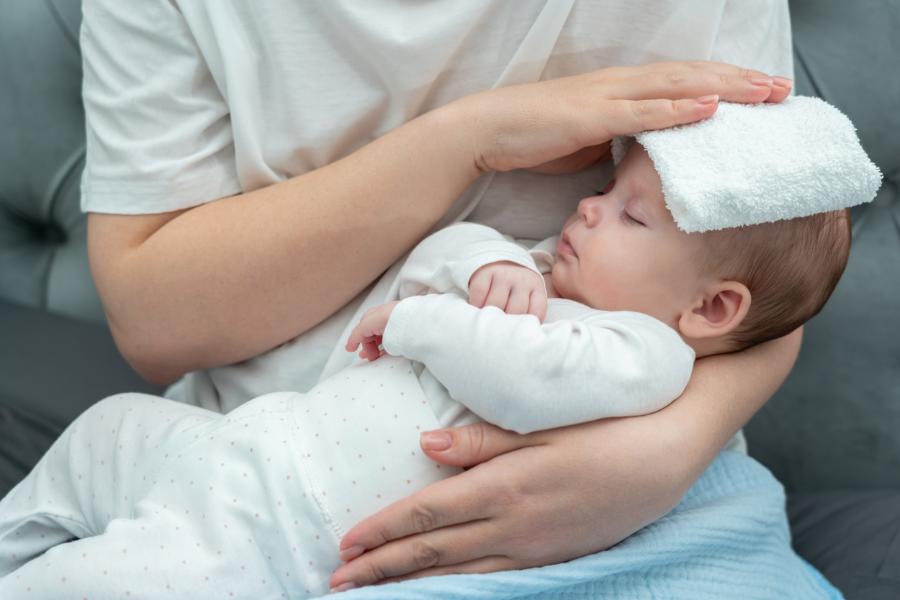Every parent remembers that first alarming moment when their baby feels unusually warm to the touch. While a fever can feel alarming, it’s actually one of your child’s strongest allies in fighting illness. This natural defense mechanism has protected humans for thousands of years, and understanding it can bring you peace of mind during those anxious moments.
Knowing how to respond to your little one’s fever can mean the difference between a restful night and hours of unnecessary worry. By learning how to recognize symptoms, respond appropriately, and know when to seek help, you’ll gain an essential parenting skill that will serve you well.
Recognizing Fever in Your Little One
Spotting Symptoms Early
Fever in infants and toddlers comes with telltale signs. Your baby may become unusually fussy or irritable, and their skin might feel warm and look flushed. You might notice damp clothing or hair, although sweating isn’t always obvious in younger babies.
Key Symptoms of Fever
- Fussiness or irritability
- Warm or flushed skin
- Decreased interest in feeding
- Trouble sleeping
- Increased crying
- Low energy or listlessness
It’s helpful to track your child’s normal temperature when healthy. Knowing what’s typical for your baby can make identifying a fever easier.
Why Does Fever Happen?
The Body’s Natural Defense
When your baby has a fever, remember that it’s not an illness itself but rather their body’s way of fighting off infection. A fever creates an environment that’s less hospitable for germs, helping your little one’s immune system work more effectively.
Common Causes of Fever
- Viral Infections: Colds, flu, and other viruses
- Bacterial Infections: Ear infections, strep throat, etc.
- Routine Vaccinations: A mild fever after vaccinations indicates a healthy immune response
- Overheating: Excess clothing or a hot environment can raise body temperature
Choosing the Right Thermometer for Your Baby
Accurate temperature measurement is key in managing your child’s fever, and different types of thermometers suit various age groups. Here’s a quick guide to help you choose the best option:
Rectal Thermometers
-
- Best For: Babies under 3 months
- Pros: Provides the most accurate reading for infants, making it the gold standard for newborns.
- Cons: May feel intimidating for parents; requires careful handling.
- Tip: Always apply a small amount of lubricant to make insertion smoother and hold the thermometer steady.
Forehead (Temporal) Thermometers
-
- Best For: Babies 3 months and older
- Pros: Quick and non-invasive; comfortable for babies who may dislike other methods.
- Cons: Accuracy can be affected by sweat or room temperature; can be pricier than other options.
Ear (Tympanic) Thermometers
-
- Best For: Babies 6 months and older
- Pros: Quick and fairly accurate for older infants and toddlers; easy to use on a wiggly child.
- Cons: May be less accurate in infants due to small ear canals; not recommended for newborns.
Armpit (Axillary) Thermometers
-
- Best For: Older babies and toddlers, or as a backup method
- Pros: Convenient and non-invasive; quick for an initial check.
- Cons: Less accurate than rectal or forehead methods, so follow up with another method if it shows a high reading.
Note: Avoid using mercury thermometers as they can break and pose health hazards. Always use digital thermometers designed for infants and follow instructions carefully to ensure accurate readings.

“A fever isn’t an illness. It’s a symptom of one.” Webmd
Baby Fever Chart
| Age Group | Temperature | Action | Notes |
|---|---|---|---|
| Under 3 Months | 100.4°F (38°C) or higher | Call a doctor immediately | Fevers in infants this age require immediate medical evaluation. |
| 3 to 6 Months | 102°F (38.9°C) or higher | Call a doctor if the fever persists or is accompanied by other symptoms | Monitor closely; seek care if fever is persistent or child appears uncomfortable. |
| 6 to 12 Months | 102°F (38.9°C) or higher | Monitor and call a doctor if fever persists; consider fever-reducing medication for comfort | Ensure hydration; use fever-reducing medication if child is uncomfortable. |
| Over 12 Months | 104°F (40°C) or higher | Monitor and seek medical advice if fever persists or child seems unwell; use fever reducers as needed | Encourage rest and hydration; avoid aspirin and check with a doctor if needed. |
When to Seek Medical Attention
As a parent, you may wonder: “Is this fever something serious?” Here’s a quick guide to help you decide:
- For babies under 3 months: Call the doctor if the temperature is 100.4°F (38°C) or higher.
- For infants 3 to 6 months: Call if the temperature reaches 102°F (38.9°C) or higher.
- For any age: Seek medical attention if the fever lasts more than 5 days or is accompanied by concerning symptoms like difficulty breathing, persistent vomiting, or a rash.
Emergency Symptoms to Watch For:
- Limp or unresponsive behavior
- Difficulty breathing
- Blue lips or skin
- Seizures or convulsions
- A rash that doesn’t fade when pressed
Remember, you know your baby best. If something feels off, trust your instincts and get help.
Managing Fever at Home
Simple Steps to Keep Your Baby Comfortable
Most fevers don’t require treatment and will pass on their own. However, there are a few things you can do to help your baby feel more comfortable:
- Hydration: Offer extra fluids to prevent dehydration. Breastmilk or formula is best for young infants.
- Light Clothing: Dress them in breathable, lightweight clothes.
- Calm Environment: Create a restful, quiet space to encourage sleep.
Medication and Treatment
If your baby seems uncomfortable, you might consider fever-reducing medication. Here are some guidelines:
- Use acetaminophen (for babies over 2 months) or ibuprofen (for those over 6 months). Always follow age-appropriate dosing instructions, and check with your pediatrician if unsure.
- Avoid aspirin: This can lead to Reye’s syndrome, a rare but serious illness.
- Don’t rush to lower the fever itself; focus on your baby’s comfort.
“Don’t give your child aspirin for any reason unless it’s prescribed by a doctor”
Home Remedies to Soothe Fever
In addition to medication, gentle home remedies can provide relief:
- Lukewarm Sponge Bath: Use a lukewarm washcloth on their forehead to help cool them.
- Avoid Cold Baths: These can cause shivering and discomfort.
- Offer Fluids Regularly: Fever increases the risk of dehydration, so offer breastmilk or formula frequently.
Preventing Dehydration and Encouraging Fluids
Keeping Your Baby Hydrated
With fever, the risk of dehydration increases, so make it a priority to offer fluids regularly. Infants under 6 months should be given breastmilk or formula only, while older babies can also be offered water or diluted juice.
Quick Quiz: Test Your Knowledge on Baby Fevers
- At what temperature should you call the doctor for a baby under 3 months old?
- a) 99.5°F
- b) 100.4°F
- c) 101°F
- d) 102°F
- True or False: You should give aspirin to a baby with a fever.
- Which of the following is NOT a recommended way to check a baby’s temperature?
- a) Rectal thermometer
- b) Forehead thermometer
- c) Cold bath
- d) Ear thermometer for babies over 6 months
- Why does a fever occur in babies?
- a) To signal hunger
- b) To help the body fight infection
- c) To show discomfort
- d) To indicate dehydration
- True or False: Fever always requires medical treatment to reduce the temperature.
Answers
- b) 100.4°F
- False
- c) Cold bath
- b) To help the body fight infection
- False

In Closing: Trust Your Instincts and Stay Informed
Managing your little one’s fever doesn’t have to be overwhelming. By knowing the signs, taking accurate temperature readings, and recognizing when to seek medical help, you can approach fever episodes with confidence. Remember, fever is often a friend helping your child fight infection.
Stay informed, but don’t forget to trust your instincts. Most fevers resolve on their own with proper care, but if you’re ever unsure, your healthcare provider is just a call away. Your peace of mind and your child’s comfort are the top priorities during these moments.
Need personalized advice on managing your child’s fever? Our caring team at East Lake Pediatrics is here to help. Don’t hesitate to give us a call today and let us support your family’s health with expert guidance and compassionate care.
The information provided in this blog is for educational purposes only and is not a substitute for professional medical advice. Always consult a qualified pediatric healthcare provider for accurate diagnosis, treatment options, and answers to specific medical questions regarding your child’s health.

